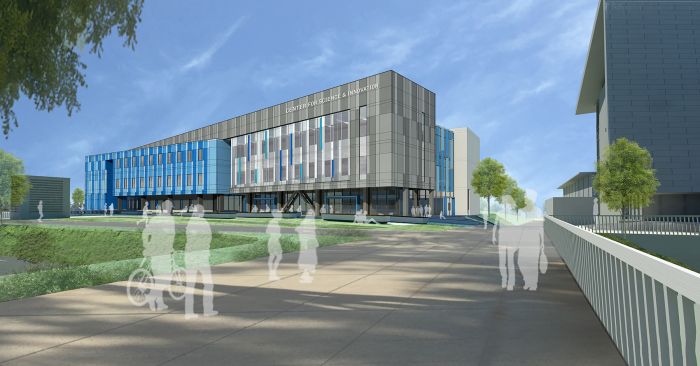 Biology students at Cal State Dominguez Hills will soon be able to do their own DNA sequencing, seeing the molecular structures of plants, bacteria and other living things more closely than ever before.
Biology students at Cal State Dominguez Hills will soon be able to do their own DNA sequencing, seeing the molecular structures of plants, bacteria and other living things more closely than ever before.
The Carson university’s Department of Biology has won a National Science Foundation grant for $216,310 to purchase an Illumina MiSeq DNA sequencer.
“We can do tons more experiments,” said Karin Kram, an assistant professor of biology who led a team that sought the grant. “One of the things I’d really like to do is have students in my microbiology classes identify microbes found on our phones. Now, we identify them to a genus level with biochemical tests. But, with this, we can identify them to a species level.”
University upgrades
The announcement comes as the school prepares for a Thursday ground-breaking ceremony at its $82 million Science and Innovation building that will include a Toyota-financed fabrication laboratory or “fab lab.”
The 90,000-square-foot building will have three stories with separate spaces for physics, biology and chemistry studies.
Toyota, which is finishing the move of its Torrance headquarters to Texas, also financed an additional four new mobile “fab labs” at the school, along with help from the W.M. Keck Foundation.
The mobile labs will be unveiled at the college Wednesday as part of a national network of hundreds of similar mobile-technology classrooms. They will have equipment needed for advanced work in science, technology and engineering, such as printers and modeling software, laser cutters, vinyl cutters, and electronic components for prototyping projects.
Science, engineering focus
The campus upgrades are science-focused for a reason.
High-wage, in-demand science, technology, engineering and mathematics (STEM) jobs are projected to grow at a rate of 28.2 percent by 2024 – more than four times the rate of other occupations, according to the U.S. Bureau of Labor Statistics.
But preparing local students for these education-intensive careers will take some work.
Los Angeles County’s high school graduation rate has been on the increase, reaching 77 percent in 2015-16.
But only 68 percent of Los Angeles Unified School District students who graduated in 2008 enrolled in college. And, of those, only 25 percent obtained a college degree within six years, according to a recently published UCLA study.
To help combat that issue, Cal State Dominguez Hills also just won four federal Upward Bound grants worth $5.2 million to help 240 students at Carson, Hawthorne, Leuzinger, Gardena and Jefferson high schools get ready for college through 2022.
Upward Bound is a national college preparatory program for low-income and first-generation high school students. The university will use the money to provide academic instruction, financial aid, tutoring, test preparation, summer programs and college applications.
This is the first year South Los Angeles’ Jefferson High School has been included in the Upward Bound program, and it will receive nearly $1.3 million.
Hawthorne and Leuzinger high schools will split a nearly $1.3 million grant, while Carson and Gardena high schools will share almost $1.4 million.
More changes ahead
Amid these changes, the university’s 1960s-era, 261-acre campus is about to embark on a major overhaul, as enrollment is expected to continue to boom for the next decade. Now, about 15,000 students are enrolled.
The school is finalizing a master plan that will add new student housing, retail stores and restaurants as part of a public-private partnership.
Faculty also will benefit from the new facilities and equipment. Kram will use the DNA sequencer to advance her research into the way bacteria evolve – a critical topic as antibiotics are increasingly useless because of bacterial genetic adaptations.
The tool will help faculty mentor student science research projects, and bolster the school’s reputation as a leader in STEM studies, said Kamal Hamdan, an Annenberg endowed professor and director of the Center for Innovation in STEM Education (CISE).
“This is an amazing opportunity for our STEM teachers who teach at high-need schools and for their students,” Hamdan said. “This will place them in a much better position to inspire their own students.”
Source: Daily Breeze